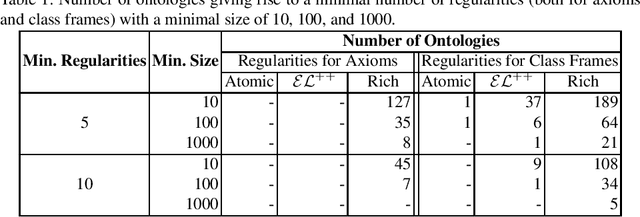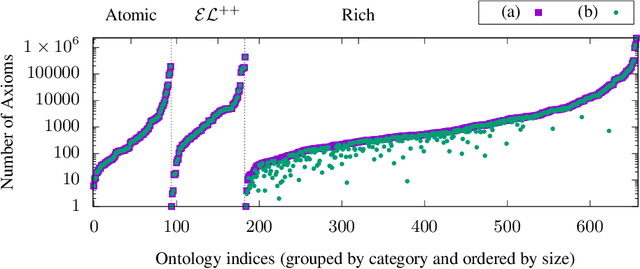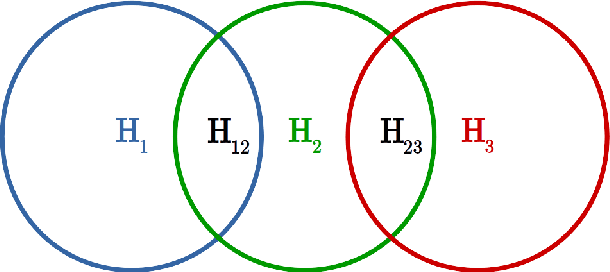Christian Kindermann
Minimal Macro-Based Rewritings of Formal Languages: Theory and Applications in Ontology Engineering (and beyond)
Dec 18, 2023Abstract:In this paper, we introduce the problem of rewriting finite formal languages using syntactic macros such that the rewriting is minimal in size. We present polynomial-time algorithms to solve variants of this problem and show their correctness. To demonstrate the practical relevance of the proposed problems and the feasibility and effectiveness of our algorithms in practice, we apply these to biomedical ontologies authored in OWL. We find that such rewritings can significantly reduce the size of ontologies by capturing repeated expressions with macros. In addition to offering valuable assistance in enhancing ontology quality and comprehension, the presented approach introduces a systematic way of analysing and evaluating features of rewriting systems (including syntactic macros, templates, or other forms of rewriting rules) in terms of their influence on computational problems.
A Survey of Syntactic Modelling Structures in Biomedical Ontologies
Jul 28, 2022



Abstract:Despite the large-scale uptake of semantic technologies in the biomedical domain, little is known about common modelling practices in published ontologies. OWL ontologies are often published only in the crude form of sets of axioms leaving the underlying design opaque. However, a principled and systematic ontology development life cycle is likely to be reflected in regularities of the ontology's emergent syntactic structure. To develop an understanding of this emergent structure, we propose to reverse-engineer ontologies taking a syntax-directed approach for identifying and analysing regularities for axioms and sets of axioms. We survey BioPortal in terms of syntactic modelling trends and common practices for OWL axioms and class frames. Our findings suggest that biomedical ontologies only share simple syntactic structures in which OWL constructors are not deeply nested or combined in a complex manner. While such simple structures often account for large proportions of axioms in a given ontology, many ontologies also contain non-trivial amounts of more complex syntactic structures that are not common across ontologies.
Generating Ontologies from Templates: A Rule-Based Approach for Capturing Regularity
Sep 27, 2018
Abstract:We present a second-order language that can be used to succinctly specify ontologies in a consistent and transparent manner. This language is based on ontology templates (OTTR), a framework for capturing recurring patterns of axioms in ontological modelling. The language and our results are independent of any specific DL. We define the language and its semantics, including the case of negation-as-failure, investigate reasoning over ontologies specified using our language, and show results about the decidability of useful reasoning tasks about the language itself. We also state and discuss some open problems that we believe to be of interest.
 Add to Chrome
Add to Chrome Add to Firefox
Add to Firefox Add to Edge
Add to Edge